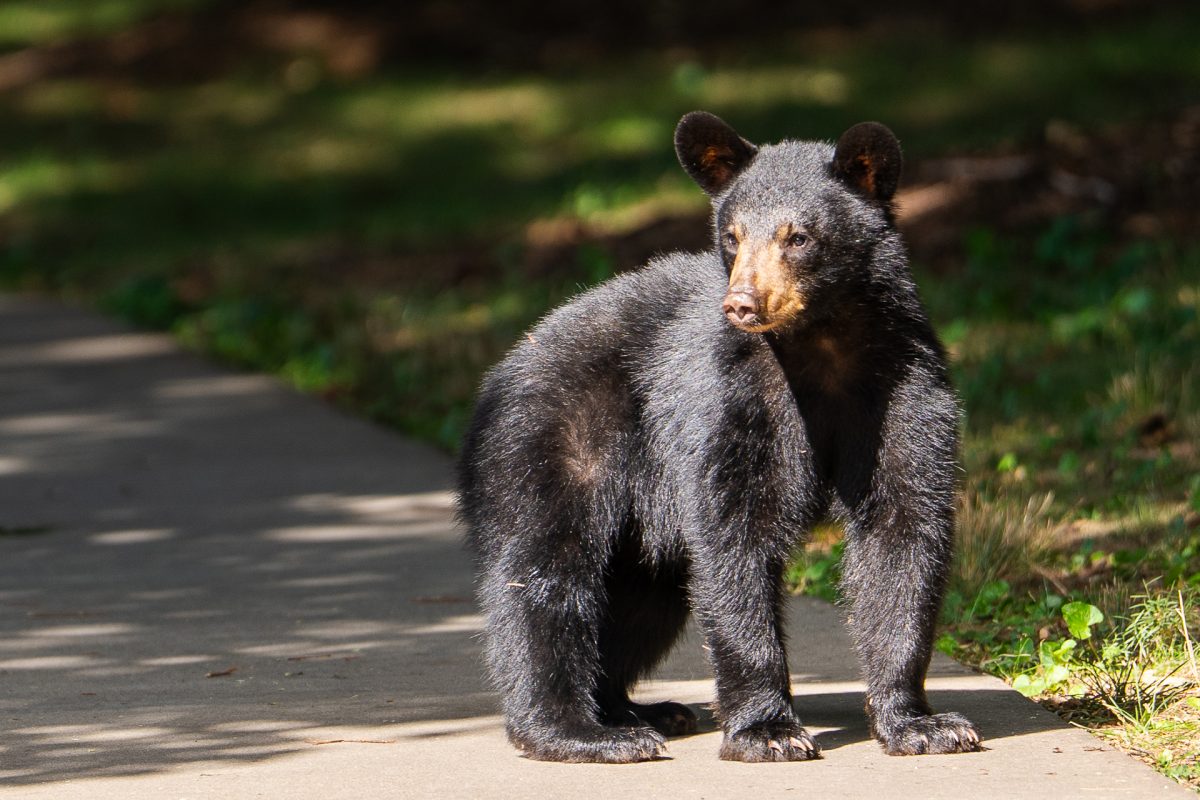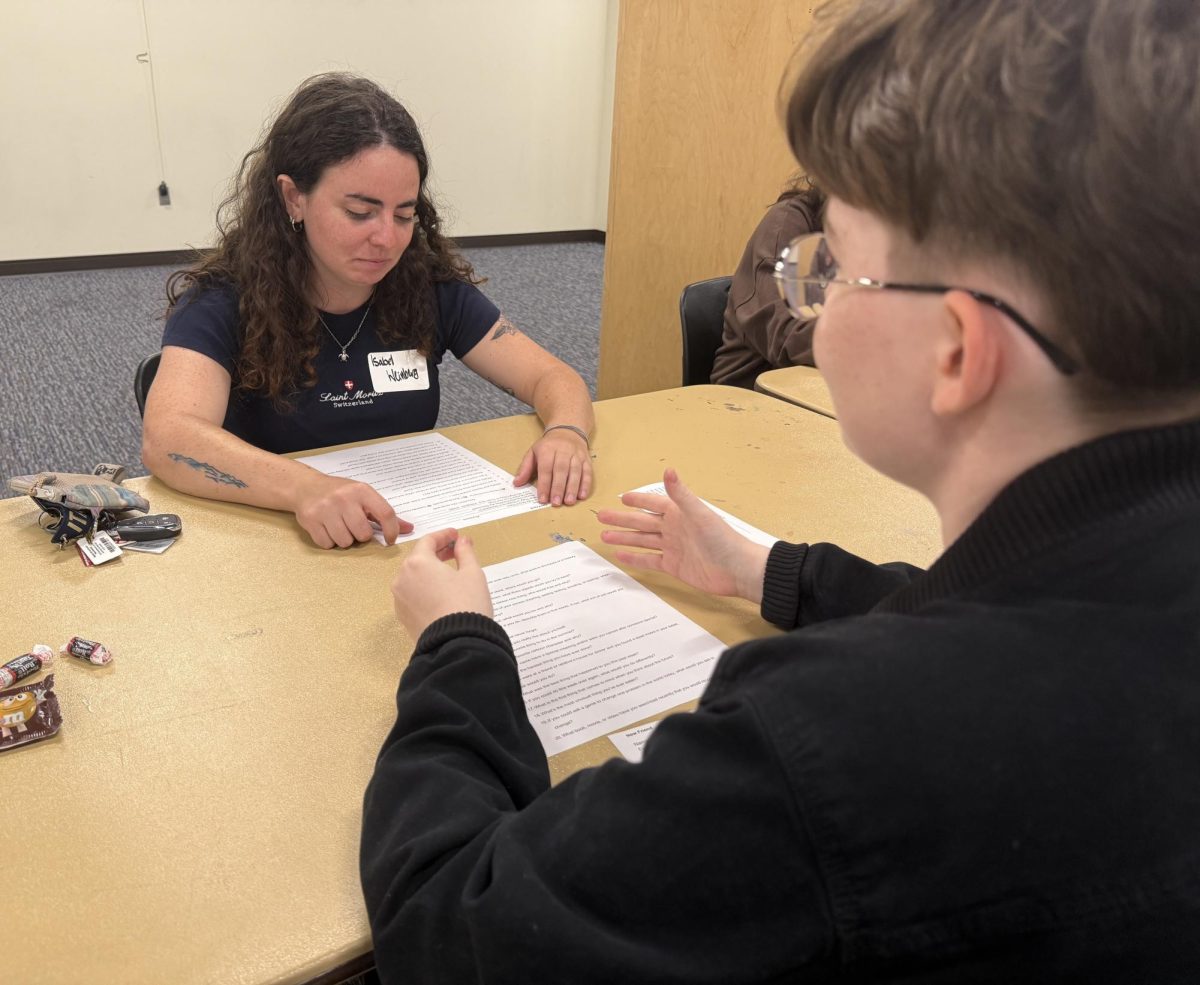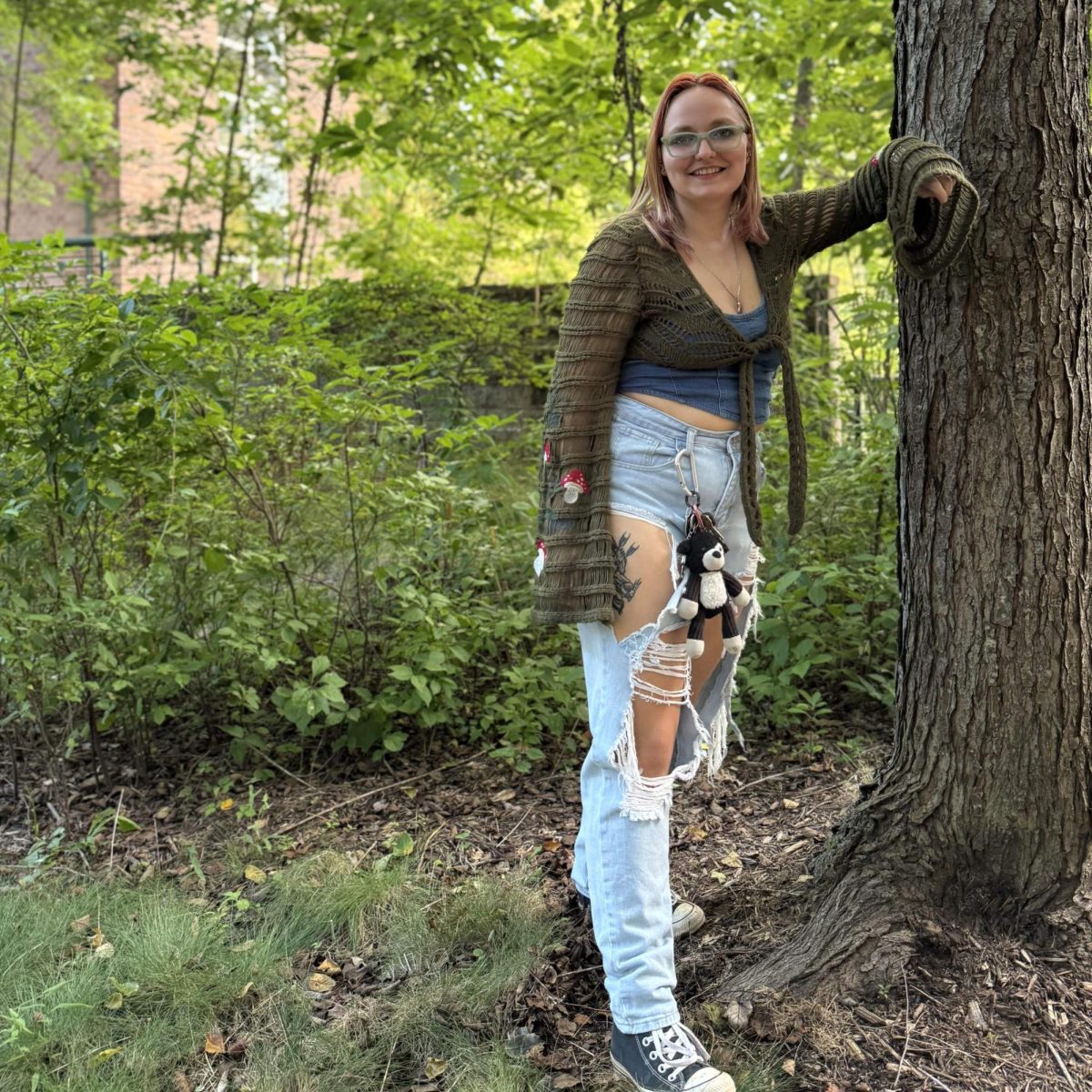By Karrigan Monk
Arts and Features editor
[email protected]
The 23-year-old art student did not realize the change would be immediate.
Mickey Bush identifies as a non-binary individual who uses they/them pronouns. They explained the binary as being male or female and identifying as non-binary means the person does not fall under either category. Mickey said there are different variations of being non-binary, but in general, a non-binary person is one who does not fit in with standard ideas of gender.
They said they began to notice a change in the nation only days after President Trump won the election.
“We’ve got a pride flag just out on our porch hung up and I remember two or three days after Trump was elected to office, my neighbor came by and told me how brave we were for having our pride flag out and I think that’s maybe when I realized that I had something to fear under this office,” Mickey said. “That’s a lot of what it was immediately afterward. Just fear of what is going to happen. How are we going to continue to live?”
For Mickey, this fear was not something they always knew. They said under the Obama administration they felt as if the queer community had an ally in times of hardship, but Trump instills a sense of fear in the community as he either ignores issues or inspires them.

“Now we don’t have anybody who is going to listen to what we’ve got to say about it. Before there was at least hope that something could change,” Mickey said. “Now it’s like we’re fighting an uphill battle in the pouring rain walking knee deep in mud trying to win a battle and still trying to have people hear us over the thundering voice of President Trump who just spouts nonsense most of the time.”
Mickey said being queer in Trump’s America is more difficult than it was in previous administrations.
Dealing with hardship is not something new for Mickey. Although they have never dealt with it on a national level, their personal life has been riddled with it.
As the oldest sibling in a single-mother household, Mickey said they were often forced to take on a parental role with their younger sister.
Cassandra Bush, Mickey’s younger sister, said she appreciates everything Mickey did for her when they were growing up.
“It was pretty hard on my mom working two to three jobs and always being away. Sometimes Mickey had to make me dinner and even put me to sleep before my mom would come home. On a child that is pretty hard but I can’t imagine how tough that role was to suddenly have to be an adult at 12, but they always managed,” Cassandra said. “Money has always been tight but me and my sibling were always fed and had our homework finished and Mickey was a big part in making that happen.”
As a child, Mickey said they began to realize they were queer as young as 5th grade. Despite this early realization, Mickey did not come out until high school when they said they were outed by a friend.
Mickey was one of a small group of closeted friends at their high school. Although they all knew and respected each other, it was one of these friends who outed Mickey by asking about their girlfriend in the middle of class. Unknown to this younger friend, no one in the class knew. Mickey said it started with someone being surprised and spread around the school so quickly their sister knew by the time they got home.
“A lot of people who would talk to me before, they didn’t really say anything negative to me, but they just stopped talking to me,” Mickey said. “The people I would usually sit by in class and talk to, they were just not about it. Definitely not the kind of control I would have liked to have over that situation, but you know, shit happens.”
This would not be the end of Mickey’s high school problems. Soon after, one of their best friends turned on them and convinced the rest of their friends to do the same. Mickey said all of these things combined caused them to have to take a day off school. This was the day they finally came out to their mother.
Mickey said their mother was very receptive and supporting of them being gay and even invited their girlfriend over. However, Mickey said their father doesn’t know and because he is not in the picture they would like to keep it that way.
Although Mickey’s mother took their being gay well, they were still afraid to come out to their mother as being non-binary. Having only started to come out as such a year and a half ago, Mickey is still in the process.
“That conversation was a lot more difficult,” Mickey said. “I didn’t even know how to begin to talk to her about that because she already had a very limited view on what being transgender is, much less on a vague transgender spectrum. So that conversation was a lot more slow and it was a lot more of her asking a lot of questions.”
Cassandra said the adjustment was easier for her than her mother, but she still struggled a bit when it came to using different pronouns.
Mickey still has trouble getting their boss to use the right pronouns and had to fight to be called the right name. They said they were lucky in high school to not have to deal with these things.
“The town that I lived in was very unforgiving for sure,” Mickey said. “I was lucky that at the time I very much fit into the female binary that people wanted me to so I didn’t really have a lot of problems.”
Despite not having problems as a non-binary individual in high school, Mickey said they are now hyper aware of issues in the queer community, especially under Trump. Even with outspoken activists and more of an awareness of the queer community, Mickey said they are still critical of what is being shown in popular culture.
“There’s a lot that people don’t really talk about when it comes to queer culture. Even with the exposure that we have now it’s kind of cosmetic,” Mickey said. “A lot of the gay culture that is exposed is handsome white gay men dancing in clubs or famous people who don’t fit the bill of what’s going on.”
Mickey criticizes this perception of queer culture because it undermines the terrible things happening to the queer community not just in Trump’s America, but globally.
Mickey said they do not see enough media coverage of these things. They pointed out that there are currently active concentration camps in Chechnya rounding up gay men and torturing and killing them. Mickey said they have seen little to no coverage of these events in mainstream news.
According to the Human Rights Campaign, their organization became aware of these atrocities as early as April via news reports and urged Secretary of State Rex Tillerson to condemn what was happening. As of June, Tillerson has remained silent on the issue.
Mickey also said they have noticed an increase in transgender people being murdered in cold blood. The HRC backs up this claim, reporting there were 22 transgender people killed in the U.S. in 2016 and 2017 has already seen 20 deaths, the most recent being Derricka Banner, who was shot to death on Sept. 12 in Charlotte.
“Trump’s rhetoric has shaken the queer community,” Mickey said. “We live under a president now where that kind of anti-queer rhetoric is fine. Before that kind of homophobia and bigotry in general toward queer communities was — it’s not to say it didn’t happen, it definitely did — but we were living under a president who stood by us.”
Ashley Moraguez, UNC Asheville assistant professor of political science, said while Trump is generally a wildcard on LGBTQ+ issues, he often referred to the issue of same sex marriage as “fine.”
Moraguez said the recent ban on transgender people serving in the military paints a different picture of Trump.
“Trump first announced the policy in a tweet and it received a lot of popular criticism as well as criticism from leaders of the armed forces,” Moraguez said. “While Trump is commander in chief and has the power to direct the armed forces, the pushback he’s been getting from military leaders is telling.”
For Mickey, this ban is more personal. They said they have friends in the military who are transgender and they do not know what will happen now, particularly in terms of school. Mickey said their friends had planned to serve their country after graduating high school and use their benefits to go to college. Now, no one knows if they will actually be able to do this or not.
Mickey said while they are cautious to believe anything Trump says and believe he instigates a lot of hate in the country, they will continue to fight for the queer community.
“Everybody has the mentality of, ‘Oh, they legalized gay marriage, the fight is over, the fight is won,’ but it’s not. It’s not,” Mickey said. “There’s always something to be done and I think being part of that and being an activist for it is trying to make sure those things do get done so that the queer youths that are coming up now will have it easier than we had it and we have it easier than people in the ‘90s had it. It’s just about ever moving forward.”


![Brooke Pedersen [second from the right] and Luis Reyes [right] hold banners during the Wrap The Woods event.](https://thebluebanner.net/wp-content/uploads/2025/09/ELIZABETH_PRITCHITT_IMG_3470-1200x804.jpg)




















